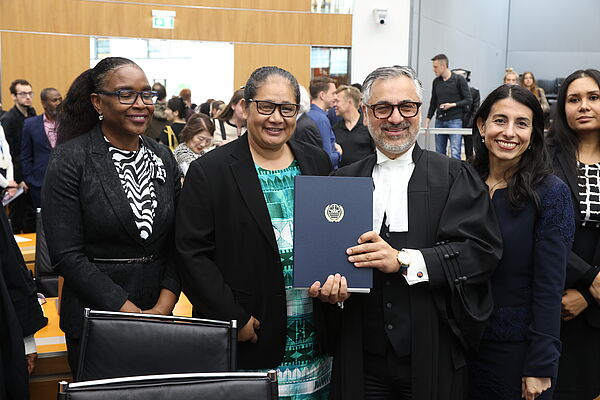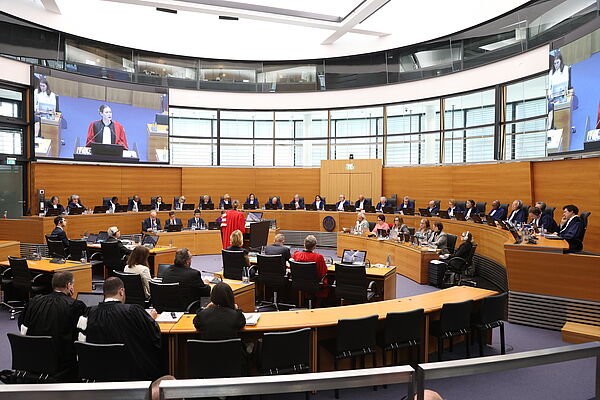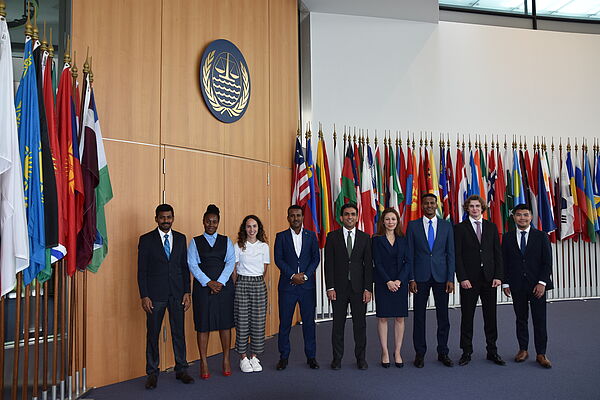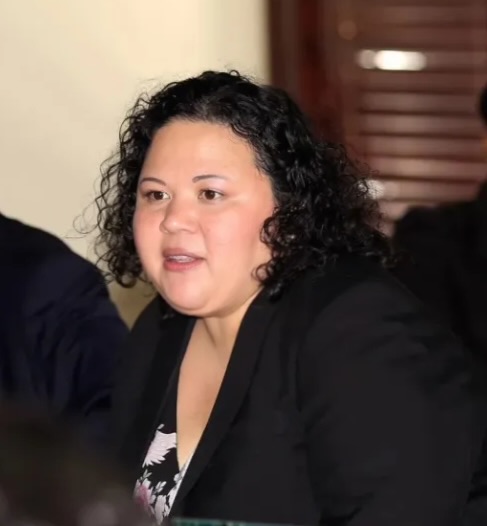Newsletter 2024/2
Newsletter 2024/2 - July 2024
Introduction
I am delighted to present to you to the summer newsletter of the Tribunal. It has been a busy couple of months since our last newsletter, with the advisory opinion in the Request for an Advisory Opinion submitted by the Commission of Small Island States on Climate Change and International Law delivered on 21 May, and the Order in The “Zheng He” Case (Luxembourg v. Mexico), Provisional Measures delivered on 27 July.
There has been extensive discussion about the latest advisory opinion of the Tribunal. From my own perspective, I feel that it is crucial to emphasize that the Tribunal had to navigate a highly complex scientific context and consider a wide range of other rules of international law relevant to the Request before it. This accomplishment demonstrates the Tribunal’s ability to address intricate disputes and legal questions that may arise in the future. I believe that the Tribunal has effectively provided a comprehensive guide to the specific obligations of States Parties under the Convention, putting them in good stead to tackle the sizeable challenges posed by climate change.
As you will read later in the newsletter, in addition to our judicial activities, our capacity-building programmes are running at full speed: the interns and fellows at the Tribunal this summer have recently been joined by a group of about 40 participants of the IFLOS Summer Academy. We are also happy to have taken our first Junior Professional Officer on board in July and look forward to welcoming legal advisers of Latin American and Caribbean States to the third ITLOS Workshop for Legal Advisers (sponsored by the Republic of Korea) in September. Embracing individuals with varied academic backgrounds and experiences, our training programmes are designed to nurture both current and future generations of legal experts and practitioners, providing them with valuable insight into the work of the Tribunal and the dispute settlement procedure enshrined in the ocean governance framework.
I hope that you enjoy reading this newsletter.
With my warmest regards,
Tomas Heidar
President
ITLOS Cases

Case No. 31: Request for an Advisory Opinion submitted by the Commission of Small Island States on Climate Change and International Law (Request for Advisory Opinion submitted to the Tribunal)
The Tribunal delivered its unanimous advisory opinion on climate change on 21 May 2024.
Case No. 32: The M/T “Heroic Idun” (No. 2) Case (Marshall Islands/Equatorial Guinea)
Both the Marshall Islands’ Memorial and Equatorial Guinea’s Counter-Memorial were filed within the prescribed time limits set by Order 2023/5 of the President of the Special Chamber, Judge Albert Hoffmann.
After ascertaining the views of the parties, Judge Hoffmann authorized a second round of pleadings by Order 2024/2, with the Reply to be submitted by the Marshall Islands by 25 November 2024 and the Rejoinder by Equatorial Guinea by 24 March 2025.

Case No. 33: The “Zheng He” Case (Luxembourg v. Mexico)
Following the hearing on 11 and 12 July 2024, the Tribunal delivered its Order on Provisional Measures on 27 July 2024. In its Order, the Tribunal finds that the circumstances, as they now present themselves, are not such as to require the exercise of its powers to prescribe provisional measures under article 290, paragraph 1, of the Convention.

Interview with Judge Konrad Marciniak (Poland)
Together with five other new judges, you were sworn in as a member of the Tribunal on 2 October 2023. What are your first impressions and what are your hopes for the Tribunal in the coming years?
Even though I was sworn in relatively recently, I must say I feel rather “at home” at the Tribunal. This is undoubtedly due to the fact that I did an internship with the Tribunal some years back and have been in contact ever since – for example, in the framework of the Nippon Programme where I taught some courses on a regular basis. Hence, I feel rather familiar with the Tribunal, I know many of its professional staff, and finally – the law of the sea world is not that big after all – I had also already previously gotten to know many of the judges – those who were sworn in with me as well as those who were already on the bench before me.
As some of the current interns revealed to me recently, they were pleasantly surprised to find that the Tribunal is very welcoming and everybody so approachable. I think this is indeed the case (and I certainly try to contribute to building such an atmosphere in our workplace).
As to my hopes for the Tribunal, I certainly wish for it to be able to continue to develop its jurisprudence in a stable and predictable manner, living up to the hopes and expectations of past, current and future generations. Clearly, the primary “clients” of the Tribunal are (mostly) States and they need to feel they can entrust the Tribunal with oftentimes sensitive issues – whether they relate to maritime boundaries, the extent of their sovereign rights and jurisdiction in their maritime zones, or their vessels. On the other hand, decisions such as the recently delivered advisory opinion concerning climate change hopefully show that the impact of the Tribunal can leave a significant imprint on the international community, including, even if indirectly, individuals and other non-State actors.
Having played an active role as a delegate in the Intergovernmental Conference on an international legally binding instrument under UNCLOS on the conservation and sustainable use of marine biological diversity of areas beyond national jurisdiction, what do you see as the next steps for the agreement once it has entered into force?
Indeed, it is not often that you get to see both the beginning and the end of major international, multilateral negotiations. I was lucky enough to witness and participate in the whole of this process, from its inception up until the adoption of the text of the BBNJ Agreement (as it is often referred to). Now, I’ve observed from an “external” perspective, but with great interest, that the Preparatory Commission for the entry into force of the BBNJ Agreement and the convening of the 1st meeting of the Conference of the Parties (COP) to the Agreement has already met. I’ve seen that further meetings are already scheduled. This bodes well, as everybody familiar with the provisions of the BBNJ Agreement will know that the first COP is bound to be a very busy one, as many crucial decisions are then to be adopted. Therefore, such preparations – one may add, following suit, to some extent, to the process after the adoption of UNCLOS – are very relevant, both for substantial reasons and more generally, i.e., to keep up the momentum that was generated by the adoption of the Agreement. While, indeed, “the ship has reached the shore”, as the President of the Conference, Ms Rena Lee, famously declared upon the adoption of the text of the Agreement, now it must sail further – gather the necessary number of ratifications (60) for its entry into force, and establish its institutions and regulations.
While it would perhaps be premature at this stage to speculate about whether any cases in relation to the BBNJ Agreement might come to the Tribunal, I will however say the following. First, it is good for global ocean governance that the UNCLOS mechanisms for the settlement of disputes were generally maintained for the purposes of the BBNJ Agreement. It wasn’t an obvious end result. Second, I’ve seen that the advisory jurisdiction of the Tribunal as a whole received a clearer and confirmed status, as the BBNJ COP may decide to request the Tribunal “to give an advisory opinion on a legal question on the conformity with this Agreement of a proposal before the Conference of the Parties on any matter within its competence”. Once the Agreement enters into force, it will be for the States and the COP to decide whether and how to utilize these legal avenues.
In view of the recent delivery of the advisory opinion on climate change, where do you see the potential for the Tribunal’s advisory rather than contentious jurisdiction?
Again, it wouldn’t be wholly appropriate for me to speculate about requests for advisory opinions, but let me attempt to answer this question as follows. First, there is certainly a surge in the practical (and academic) interest in advisory opinions, whether they be before ITLOS or before other international courts and tribunals. Second, this mechanism allows for the formulation of relatively abstract legal questions and for clarification on them to be sought outside the context of a (bilateral) contentious dispute. Third, I think it is increasingly recognized that an actual advisory opinion can positively contribute to the clarification and development of international law on a given issue and, thus, better explain what the law says, what the specific rights and obligations of States are, and thereby increase the predictability of applicable legal obligations (while at the same time, at least to some extent, decreasing the chances of an actual dispute arising). I think this applies to all three advisory opinions the Tribunal has delivered so far. Fourth, it is also recognized – and argued sometimes as a positive or sometimes dubious practice – that requests for advisory opinions are part of a broader legal litigation strategy (or “lawfare”, as some like to frame it). Be that as it may, I think those that ask questions and those that answer them need to be aware of the overall context and also be cognizant of the fact that there is a limit to what any international court or tribunal can say and do; that the primary actors of international law are States; and that some problems, particularly of a global character, do require a concerted, appropriate response on their behalf.
Lastly, I would just underline that, as mentioned above, I feel it is a vote of trust and confidence in the Tribunal that the BBNJ Agreement recognized its advisory jurisdiction and, whether in accordance with UNCLOS or the Agreement, the Hamburg judges will stand ready, if called upon, to answer, in a timely manner, any law of the sea related questions that may arise. As I think is inherent in your question, there are many noteworthy developments in “our” field – concerning the environment, marine biodiversity or the seabed, to name just a few – that do provide potential for further progress.
The Baltic has been described as arguably the world’s most heavily regulated sea area, with multiple layers of governance and regulation. Looking back to your time at the Ministry of Foreign Affairs of Poland, would you say that the layers interact well – and in conformity with UNCLOS – or is there room for improvement, in particular in terms of marine environmental protection?
Indeed, the Baltic Sea is sometimes described from the perspective of multilayered regulation, with up to possibly six layers being identified in this context (general international law, regional conventions, EU law, national laws, local and municipal rules as well as non-binding arrangements). Also, one may add that out of nine Baltic Sea coastal States, all but one are members of the EU and NATO. If you consider the catchment area draining into the Baltic, it comprises 14 States with a population of around 100 million people.
Having said that, I have never considered the Baltic Sea an “overregulated” sea basin nor was that my practical experience. Yes, it is true that there is a lot of regulation in place (although most, at least as a matter of law and theory, should work well together, as in many respects they would be based on or in accordance with EU regulations and/or worked out in the HELCOM framework). However, one should recall that, at least from the UNCLOS perspective, the Baltic should be considered an “enclosed or semi-enclosed sea”, whereby bordering States have an enhanced set of obligations to cooperate and coordinate their activities, either directly or through an appropriate regional organization. I believe this is happening in the Baltic region, and I wouldn’t say that it is the sheer quantity of regulations and institutions frustrates that aim but rather, as always, the quality of cooperation. Sometimes opposing political and/or economic goals lead to tensions or unresolved challenges. Among the latter, one could certainly include, for instance, the need to curb land-based pollution or ways to deal with dumped chemical munitions.
Overall, given the fact that the Baltic Sea is relatively small, with basically no areas beyond national jurisdiction (the whole basin being covered by territorial seas, exclusive economic zones and continental shelves of coastal States), and that there is increased demand for space (due to energy projects, fishing, intense maritime transport, etc.), the need to have solid platform(s) for cooperation as well as a robust regulatory framework becomes understandable.
Over the years, you have participated in and lectured at numerous capacity-building programmes, workshops and conferences on the law of the sea. What advice do you have for the younger generations of law of the sea students, in particular those from Eastern Europe, who are looking to pursue a career in this area of international law?
I think my primary advice would be to be bold, not to be afraid and actually apply for these various programmes and opportunities. It may be a cultural thing, but I guess we sometimes assume too easily (and unnecessarily) that we will “not get it”, that maybe a given course is too “advanced” for us or, for any other reason, we are “not good enough”. From my experience, this is often not the case. Additionally, Eastern Europe is also often underrepresented in many fora, which can actually work to our advantage in terms of increasing our chances for getting in where we desire.
What remains a problem is the funding/financing issue. Many of the capable and wonderful students or early career professionals from Eastern Europe will require some form of support or assistance and, here, it is sometimes problematic. This is particularly the case for those countries from this block that would fall under the “developed countries” label. I do understand the need for such distinctions but recognize at the same time that they are to some extent artificial and do not reflect the reality “on the ground”.
Overall, I would strongly encourage my colleagues from Eastern Europe to not hesitate and to pursue their goals and careers, including by taking a proactive approach with respect to participation in capacity-building programmes, workshops and conferences. When it comes to any international law-related subject, including the law of the sea, this will result not only in gaining knowledge and experiences but also in making invaluable acquaintances and forming friendships which will foster personal and professional development.
Capacity building

Our outgoing interns, Mr Amédée Cloet (Belgium), Mr John Saylay Singbae II (Liberia) and Ms Tajra Smajic (Bosnia and Herzegovina) presented their research projects before their departure in June, looking at UNCLOS and the preservation of biodiversity in coastal areas, Environmental Impact Assessments under UNCLOS and the BBNJ Agreement, and the Advisory Opinion’s relation to deep-sea mining. Currently, Mr Mahamat Annouar (Chad), Ms Stephanie Prufer (Brazil), Mr David Roucek (Czech Republic) and Mr Viet Tran (Viet Nam) are attached to the Legal Office for a summer internship. The four interns have been joined by six fellows, Ms Keneilwe Chakalisa (Botswana), Mr Ibrahim Abdu Mohammed (Eritrea), Ms Anita Rayegani (Hungary/Canada), Mr Yousef Salah (Libya), Mr Perumal Thulasidhass (India) and Ms Khawla Wakkaf (Syria). The eighteenth ITLOS-Nippon Foundation Capacity-Building and Training Programme on Dispute Settlement under UNCLOS started this week for the six fellows, who have joined approximately 40 participants for the 2024 session of the IFLOS Summer Academy, which will be held at the Tribunal from 28 July to 23 August 2024.
Following on from two successful workshops organized for legal advisers of the Ministries of Foreign Affairs of States from the South-East Asian and Pacific Islands and from Africa, we look forward to welcoming representatives of the Latin American and Caribbean States to the third ITLOS Workshop for Legal Advisers (sponsored by the Republic of Korea), which will run from 1 to 6 September 2024. President Heidar, Vice-President Chadha, Judge Rhee, and the four judges from the Latin American and Caribbean region will give lectures and presentations, together with an expert faculty of law of the sea academics and practitioners.
Meet the ITLOS Alumni

Kimberley Lam, Head of the Maritime and Ocean Affairs Bureau, Ministry of Foreign Affairs, The Bahamas
When I joined the Ministry of Foreign Affairs in 2006, I certainly did not expect my professional trajectory to take me where I am today. With a Master’s Degree in Conflict Analysis from King’s College London and my Bachelor’s in International Conflict Mediation and Reconciliation from Brandeis University, I anticipated a path situated more broadly in the realm of diplomacy and international affairs.
In 2008, however, I was assigned to the Legal Affairs Division of my Ministry in the midst of the country’s Archipelagic Baselines project which we were spearheading. It is there that I began my journey in law of the sea and ocean affairs. Having been fortunate enough to be selected as one of the 2009-2010 ITLOS-Nippon fellows, I was able to build the foundation that has defined much of my career. I still remember with fondness the days of plotting ambitious azimuths for imaginary boundary disputes in our group exercises in IFLOS.
Since that time, I have moved to areas outside of law of the sea, including in other divisions within the Foreign Ministry and a couple of overseas postings. These experiences enriched my understanding of multilateralism and the role we play as diplomats. In 2016, however, I returned to law of the sea. The Maritime and Ocean Affairs Bureau, which I’ve headed since 2018, has primary responsibility for the coordination of the work of the multisectoral, legislated National Maritime Delimitation Committee (MDC). As a member of the MDC, I participated as a delegate in The Bahamas’ maritime boundary delimitations with the Republic of Cuba, which we concluded in 2011, and then as one of the lead negotiators in our ongoing discussions with the United States of America and the British Overseas Territory of the Turks and Caicos Islands. The thematic areas of my work include maritime boundary delimitation, the extended continental shelf and, more broadly, the government’s policies surrounding UNCLOS, ocean governance, bilateral and multilateral maritime agreements, as well as other maritime and oceans-related issues in coordination with the primary national authorities.
Informing all these policy considerations are, of course, the impacts of climate change which have disproportionately affected the developing world and small island States in particular. Against this reality, it is clear that the questions posed by sea-level rise in Small Island Developing States (SIDS) with respect to maritime zones and boundaries require urgent attention. What happens when our base points become submerged? What are the implications for maritime zones that have been claimed or are yet to be claimed? What does this mean for boundaries that have been agreed or are yet to be agreed? While the legal, academic and scientific debates of experts, including within the International Law Commission, are informative, necessary and fundamental to our understanding of the journey towards this answer, I would posit that those are not questions to be answered for small island developing States, but to be answered by us. That is why The Bahamas recently co-hosted with the Government of the Kingdom of Denmark and the Australian National Centre for Ocean Resources & Security (ANCORS) a Caribbean SIDS-focused capacity-building workshop to discuss these very issues. It is absolutely critical that our voices help to inform this narrative.
Coming from a small island developing nation, and against this climate change backdrop, I have followed with great interest the decisions of the courts, most recently that which emanated from the request for an advisory opinion on climate change submitted by COSIS (Commission of Small Island States on Climate Change and International Law). While ITLOS’s advisory opinion may not be binding, it broadens our understanding of environmental justice under customary international law and UNCLOS. This is a welcome development allowing us to grow our common understanding of UNCLOS and to contribute to climate change jurisprudence. At the same time, however, countries like The Bahamas that have significant ship registries must examine this opinion critically, as it does raise questions as to the scope of flag State responsibility for reducing emissions in the maritime transport sector, for example. Nevertheless, SIDS must take a hold of this pronouncement and use it as a tool to continue to support climate action.
On 11 April 2024, The Bahamas signed the Agreement under the United Nations Convention on the Law of the Sea on the Conservation and Sustainable Use of Marine Biological Diversity of Areas Beyond National Jurisdiction (“BBNJ Agreement”). This was a very proud moment, as we’d been working towards this objective since the first Intergovernmental Conferences. I was able to participate in three of the Intergovernmental Conferences and currently serve as one of the focal points for The Bahamas on the CARICOM BBNJ multi-stakeholder group. As I continue to participate in the upcoming preparatory processes for the BBNJ leading up to Oceans 2025, I am excited to see how small island States can continue to be a positive force in the multilateral arena to inform and direct policies that recognize our unique vulnerabilities and each State’s responsibilities to ensure that the Sustainable Development Goals (SDGs), in particular SDG14, can be achieved.
Upcoming events
The ITLOS-Nippon Foundation Capacity-Building and Training Programme on Dispute Settlement under UNCLOS opened on 15 July 2024.
The IFLOS Summer Academy 2024 is being held from 28 July to 23 August 2024 and will host a public event on 7 August 2024 on “Security at Sea”. For further information and to register, please visit the IFLOS site.
The third ITLOS Workshop for Legal Advisers (sponsored by the Republic of Korea) will run from 1 to 6 September 2024.
The Tribunal’s fifty-eighth administrative session will take place from 9 to 20 September 2024.
IFLOS Symposium: “30th Anniversary of the Entry into Force of the United Nations Convention on the Law of the Sea: The ‘Constitution for the Oceans’ in Light of Emerging Challenges”, organised by IFLOS and the Korea Maritime Institute, 21 and 22 September 2024.

